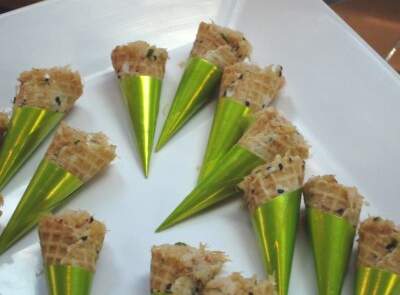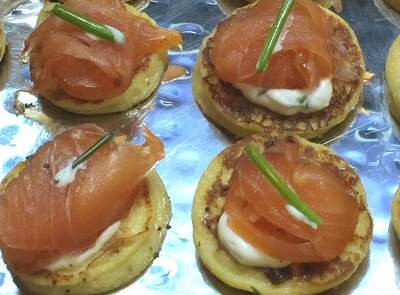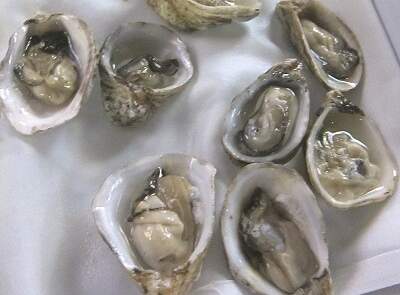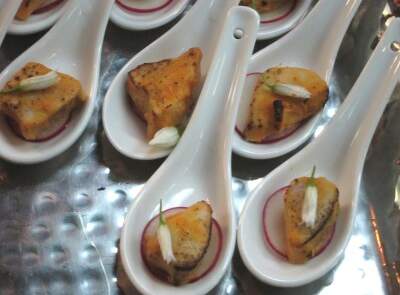by Cornelia E Nauen
The Vancouver Aquarium invited to the 10th anniversary of the OceanWise Programme in favour of sustainable seafood. Celebrating scientists, chefs and industry partners the programme of the Seafood Symposium was titled “From Fisheries to Foodies”. The beautiful premises of the Aquarium, that talks and the seafood were the perfect venue for the celebration on 27 April 2015.
Opened by Dolf DeJong, Vice President of Conservation and Education of the Vancouver Aquarium, Ann-Marie Copping, Ocean Wise Manager led through the programme in her personal caring style.
The first presentation by Dr. Daniel Pauly, Principal Investigator of the Sea Around Us Project at the Fisheries Centre of the University of British Columbia (UBC) opened with a bang. He showed the results of years of painstaking work to reconstruct the real catches of fisheries around the world.
Contrary to the global statistics compiled by the UN Food and Agriculture Organization (FAO) on the basis of government reports catches go down since the 1990s. They are also much higher than officially reported. This part of illegal, unreported and unregulated catches is huge. It varies between 60 and 30% on a global basis.


In other words, illicit activities at grand scale empty the oceans and jeopardise the food security and the livelihoods of hundreds of millions of affected people.
As if that was not enough our own, often shifting perceptions about the situation and about trends are a major obstacle in realising the true extent of the crisis and take decisive action towards recovery. Shifting baseline is the phenomenon of taking personal experience of the fishery as a reference frame for judgements without awareness of the fact that previous change already reduced the productivity of earlier fisheries and the marine ecosystems they exploited. In other words, objectives for recovery are then often set far too low as we tend to be oblivious of previous more healthy conditions. Living in a baloon of illusion is becoming a very serious problem indeed as we are literally eating through the buffers of natural ecosystems and facing much reduced resilience and capacity to rebuild after many years of abuse. So it is high time to reverse the destructive course and expand protected areas which are showing their worth in a number of places.
That talk made all participants sit up and take note. The Ocean Wise movement can play a role in translating that into more action and impact.
Three other presenters led the participants into the wonders of more specialised studies. Kathy Heise, a Research Associate of the Vancouver Aquarium’s Cetacean Research Lab shared multi-media information about the social lives and voice communication between orcas and other marine mammals to great effect. It’s not every day you can hear how resident and migrant groups talk to each other in quite different pitch and ways.
Wilf Swartz, a Research Associate of the NF-UBC Nereus Program at UBC’s Fisheries Centre, spoke about some of the economic aspects and how one might model them more realistically in support of more effective policy intervention.
Jeff Marliave, Vice President Marine Science of the Vancouver Aquarium, took the audience on an impressive visual walk through coastal ecosystems and their creatures.

After a networking break, Santi Roberts, Science Manager at Seafood Watch of the Monterey Bay Aquarium in California, USA, explained in some detail how Seafood Watch was revising and sharpening their sustainability criteria for fisheries, aquaculture and associated activities through extensive stakeholder consultation. They collaborated with other efforts, such as Ocean Wise in Canada and Marine Stewardship Council in Europe to continuously improve standards.
Peter Ross, Director of the Ocean Pollution Research Program at the Vancouver Aquarium, spoke passionately about the threats to marine life and seafood safety arising from runaway marine pollution and what could be done about it.

The banning of several persistent polychlorinated hydrocarbons and other pollutants was showing up in downward trends in the seafood samples. A real sign of hope that regulations can work if properly enforced.
Shannon Balfry, Director of the Aquatic Animal Breeding Program of the Vancouver Aquarium, added his voice by giving examples from her work.
Rashid Sumaila, Director Fisheries Research Unit at the UBC Fisheries Centre, opened his talk with a citation from deep sea explorer Robert Ballard’s TED Talk: “Why are we ignoring the oceans? If you compare NASA’s annual budget to explore the heavens, that one-year budget would fund NOAA’s budget to explore the oceans for 1,600 years”. NOAA is, of course, the US National Oceanographic and Atmospheric Administration. So, much needs to be studied and shared with a wide public to connect everybody with the ocean.
His was also the closing of the scientific presentations. He confronted the audience with impressive numbers about how massive ill-placed subsidies drove overfishing and waste of resources – the very opposite of what citizens and tax payers need.
He militated strongly in favour of taxing destructive and unsustainable economic operations to contribute to ocean recovery.

That is now among the eight practical recommendations of the Global Ocean Commission composed of political leaders and enterpreneurs.
The Commission also argued successfully in favour of a specific objective for the Ocean in the Sustainable Development Goals the UN General Assembly is set to decide about in September 2015.
Such uptake of excellent science into policy initiatives is very encouraging and shows that it’s not all gloom and doom.
The concluding remarks of the symposium came from no other than Chef Robert Clark, Ocean Wise Founding Chef Partner of The Fish Counter.
He did not mince his words and confirmed his even growing passion to make seafood production and consumption sustainable across Canada and beyond.
He underlined the special responsability of chefs and others in the seafood chain of custody to ensure healthy food for now and future generations.

Not too much a man of words, but of action, he wished the audience a good tasting experience of sustainable seafood during the reception.
The audience happily followed his and Ann-Marie Copping’s advice to leave the auditorium and gather for more informal conversations, refreshments and delicious seafood in the hall of the Aquarium between adorable marine creatures in the basins.
The Seafood We Eat activities
- World Food Day 2024, Joint Webinar with Fish Party
- UN Special Rapporteur on the right to food
- EP Hearing on EU Citizen Initiative to stop shark finning
- Keynote at the ‘Feed the Future – Innovation Lab for Fish’
- FAO webinar ‘Small, low-cost fish: from bait to plate’, 15-16/02/2021
- Enjoy delicious and sustainable seafood with Mundus maris workshops
- Chiloé, or: The disasters of Salmonopoly
- Seafood Symposium – From Fisheries to Foodies, 27 April 2015
- Baltic students concerned about sustainable foods, Rogow, Poland, 15-19 April 2015
- From plates to fuel – the controversial seaweed boom in Chile
- Khazan – Traditional coastal zone management in Goa, India
- Environmentally conscious consumer behaviour in food – what can I do?
- Save baby fish or Point ‘n’ kill?
- “Inseparable” – Fish sustainability campaign celebrates event in Athens
- Respect for minimum fish size. What do Senegalese fish mongers have to say?
- The Mundus maris campaign in the urban markets in Dakar
- Let’s save the Oceans! – Cercle Europa invites
- International Study Group Brussels: Save the Seas!
- Mercado San Miguel in Central Madrid




